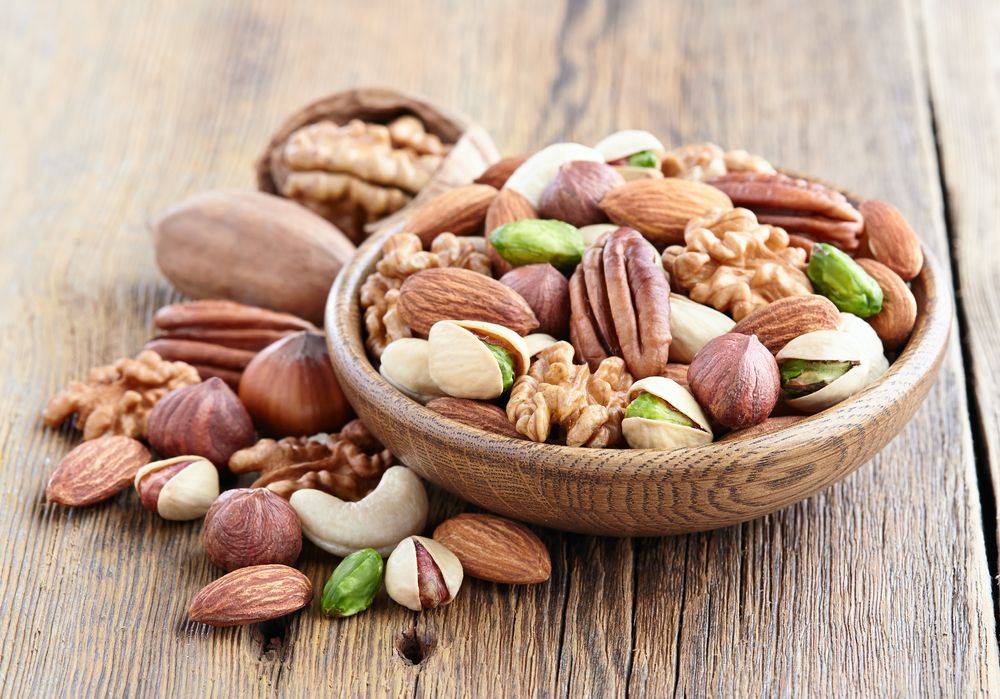Dans une société en constante croissance et soucieuse de sa santé, les gens sont toujours à la recherche du prochain superaliment qui peut contribuer à une meilleure santé. Les noix sont considérées comme un excellent aliment qui peut contribuer à un corps sain lorsqu’elles sont consommées régulièrement.
Cet article mettra en évidence dix noix saines à surveiller la prochaine fois que vous serez à l’épicerie et leurs profils nutritionnels. En outre, il détaillera également quatre avantages incroyables de la consommation de noix et précisera trois noix qui peuvent contribuer à la perte de poids.
10 noix qui sont bonnes pour la santé et leurs valeurs nutritionnelles
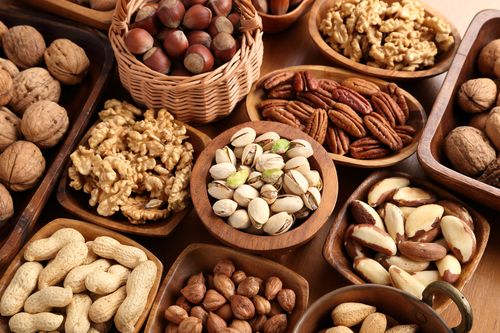
L’ajout de noix à votre alimentation n’a pas à être compliqué. Ils peuvent être consommés seuls comme collation ou peuvent être ajoutés à une gamme de plats. Les dix noix suivantes peuvent apporter des avantages significatifs pour votre santé et votre bien-être. Comme vous le remarquerez, toutes les noix ne sont pas identiques; certains contiennent plus de calories et des ratios de macronutriments différents (glucides, protéines et lipides) que d’autres.
Les valeurs nutritionnelles suivantes sont basées sur une portion de 28 g:
| Des noisettes | Calories totales | Glucides (en grammes) | Protéines (en grammes) | Lipides (en grammes) | Fibres (en grammes) |
| Amandes | 161 | 6 | 6 | 14 | 3,5 |
| Noix de cajou | 155 | 9 | 5 | 12 | 1 |
| Châtaignes | 69 | 14 | 0,9 | 0,6 | 1.3 |
| Noisettes | 176 | 6 | 6 | 9 | 3,5 |
| Macadamia | 200 | 4 | 2 | 21 | 2,5 |
| Cacahuètes | 176 | 5 | 4 | 17 | 3 |
| noix de pécan | 193 | 4 | 3 | 20 | 2,5 |
| Pistaches | 156 | 8 | 6 | 12,5 | 3 |
| Noix | 182 | 4 | 4 | 18 | 2 |
| Noix du Brésil | 182 | 3 | 4 | 18 | 2 |
Avantages de la consommation de noix
En ajoutant des noix à votre alimentation, un certain nombre de changements importants sur la santé peuvent survenir. Cette section mettra en évidence un certain nombre d’avantages associés à la consommation régulière de noix.
1) Consommer des graisses saines
Les noix contiennent de grandes quantités de bonnes graisses. Beaucoup pensent que consommer une grande quantité de graisse a un impact négatif sur le corps et peut augmenter le risque de développer des maladies chroniques. Cependant, la compréhension que les graisses sont mauvaises pour vous est obsolète.
Il est important de reconnaître qu’il existe quatre types différents de gras diététiques saturés, monoinsaturés, polyinsaturés et trans. Les gras trans se trouvent dans les aliments transformés et sont préjudiciables à la santé. Cependant, les trois autres types de graisses sont parfaitement sans danger pour la consommation. Les noix sont particulièrement riches en graisses monoinsaturées et polyinsaturées qui sont des graisses qui ont été associées à un certain nombre d’avantages pour la santé.
Ces «bonnes» graisses ont fourni de l’énergie au corps, permettent l’absorption des vitamines et minéraux clés, maintiennent la fonction du système immunitaire et nerveux, isolent le corps et régulent la pression artérielle et la coagulation. De plus, les noix sont une excellente source d’oméga 3 et 6 et, par conséquent, la consommation régulière de noix peut garantir un fonctionnement optimal du corps.
2) La consommation de noix améliore la santé cardiaque

Les graisses monoinsaturées et polyinsaturées semblent avoir un impact substantiel sur la santé cardiaque en réduisant le taux de cholestérol. De la même manière que les graisses, le cholestérol a été diabolisé au cours des dernières années, car il est souvent considéré comme la cause d’un certain nombre de maladies cardiaques. Il est vrai qu’un taux de cholestérol élevé peut augmenter votre risque, mais cela dépend du type de cholestérol.
Il existe deux types de cholestérol, les lipoprotéines de basse densité (ou LDL) et les lipoprotéines de haute densité (ou HDL). Un taux élevé de LDL dans le sang peut entraîner une accumulation de plaque dans les parois des artères et augmenter le risque de maladies cardiaques. Cependant, avoir un taux élevé de HDL dans le sang n’est pas préoccupant et peut en fait réduire le risque.
Les triglycérides sont un type de graisse présente dans le sang et un taux élevé de triglycérides peut augmenter le risque de développer des maladies et des problèmes cardiaques de la même manière que les LDL. De plus, un taux élevé de triglycérides peut également entraîner une hypertension artérielle, une glycémie élevée et une obésité. Des niveaux extrêmement élevés peuvent même commencer à interférer avec le foie et le pancréas. Des études ont montré qu’en consommant régulièrement des noix, il est possible de réduire les taux de triglycérides, réduisant ainsi le risque de développer des maladies chroniques.
Lire aussi tous les aliments pour réduire son cholestérol.
3) facilite la perte de poids

Bien qu’elles soient riches en matières grasses et en calories, les noix sont incroyablement saines. Manger régulièrement des noix dans le cadre d’une alimentation saine n’est pas associé à une prise de poids et peut même vous aider à perdre du poids. Les noix sont riches en graisses insaturées, qui, selon certaines études, augmentent l’oxydation des graisses et la thermogenèse, aidant à transformer les calories en énergie plus rapidement. De plus, les noix sont riches en fibres, ce qui peut augmenter la sensation de satiété et retarder la vidange de l’estomac, supprimant ainsi la faim et donnant à la personne une sensation de satiété plus longue.
4) Les noix contiennent une large gamme de micronutriments
Les micronutriments sont simplement des vitamines et des minéraux dont le corps a besoin pour réguler et maintenir la fonction corporelle. Un éventail de nutriments est nécessaire pour produire de l’énergie et provoquer des impulsions nerveuses et des contractions musculaires. De plus, les micronutriments sont nécessaires pour maintenir la santé et la fonction des organes, des os et du système immunitaire. Les noix contiennent une vaste gamme de micronutriments, notamment des substances telles que la vitamine E, le calcium, le magnésium, le fer, le cuivre, le folate, le phosphore, le potassium et le zinc. Par conséquent, la consommation de noix peut souvent contribuer de manière significative au maintien d’une bonne santé et d’un bon fonctionnement.
5. Riche en antioxydants
Les antioxydants sont des composés qui empêchent les dommages de se produire au niveau cellulaire. En vous assurant de consommer un grand nombre d’antioxydants, vous pouvez renforcer votre système immunitaire et réduire le risque de développer des maladies telles que les maladies cardiovasculaires, le diabète, la maladie de Parkinson, la maladie d’Alzheimer et le cancer. Plusieurs noix, telles que les noix, les pacanes et les châtaignes, contiennent un nombre extrêmement vaste d’antioxydants et peuvent donc être utiles pour prévenir un certain nombre de ces maladies.
6. Teneur élevée en fibres
La fibre est un type de glucide non digestible qui se trouve en grande quantité dans les aliments à base de plantes, y compris les noix. Les fibres sont essentielles à la digestion et, par conséquent, il est important que vous suiviez une alimentation riche en fibres. Le fait de ne pas consommer une quantité adéquate de fibres peut entraîner une gamme de problèmes digestifs tels que la constipation, le syndrome du côlon irritable (SCI) et la diverticulite.
En plus d’aider à la digestion, les fibres jouent également un rôle clé dans la stabilisation des niveaux de glucose et de cholestérol. Par conséquent, la consommation de fibres est particulièrement importante pour ceux qui souffrent de diabète et de cholestérol élevé. De plus, la consommation d’une grande quantité de fibres s’est avérée bénéfique pour le cœur. Un certain nombre d’études qui ont examiné les régimes riches en fibres ont indiqué que les fibres peuvent réduire le risque de développer des maladies chroniques telles que les maladies coronariennes, les accidents vasculaires cérébraux, le diabète et le cancer.
On peut en conclure qu’en consommant régulièrement des noix, vous pouvez augmenter la quantité de fibres que vous consommez chaque jour, améliorant ainsi votre santé digestive et réduisant le risque de maladie.
3 meilleures noix pour perdre du poids
Comme indiqué précédemment, pour que la perte de poids se produise, les calories doivent être limitées, mais un certain nombre d’études ont indiqué qu’une sélection de noix peut accélérer le processus de perte de poids.
Cette section passera en revue les avantages spécifiques de perte de poids associés aux amandes, aux pistaches et aux noix.
1) Amandes
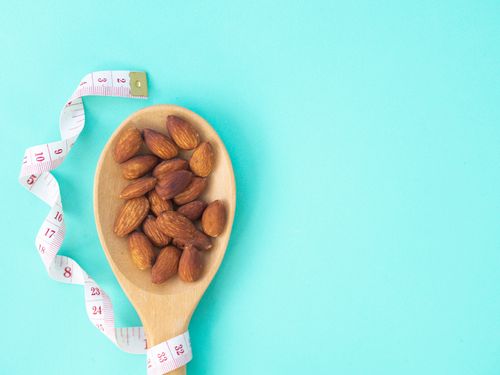
De nombreuses études ont été menées sur la consommation d’ amandes et la perte de poids. Les résultats indiquent systématiquement que la noix contribue à favoriser la perte de poids. Une étude particulière portant sur les femmes en surpoids a révélé que celles qui mangeaient des amandes perdaient trois fois plus de poids et diminuaient le tour de taille plus rapidement que celles qui ne le faisaient pas.
2) pistaches
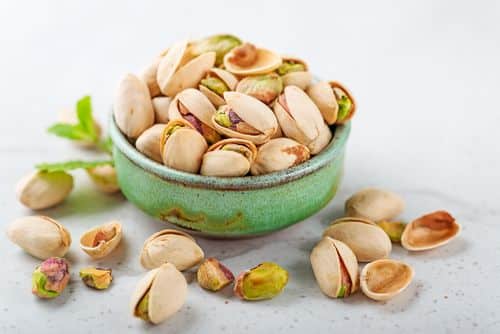
Les pistaches ont également été documentées pour entraîner des changements positifs dans le poids corporel. Une étude a non seulement indiqué que les pistaches peuvent contribuer à la perte de poids, mais il a également été constaté qu’elle entraînait une diminution des taux de triglycérides.
Avec les noisettes, les amandes et les pistaches contiennent les plus grandes quantités de protéines par portion à six grammes. Les protéines sont un élément important de la perte de poids, car la consommation de protéines affecte les niveaux de satiété; en suivant un régime riche en protéines, vous vous sentirez rassasié plus longtemps. Rester rassasié plus longtemps peut aider à réduire les collations, la fréquence des repas et la taille des portions. En réduisant ces trois facteurs, vous pouvez réduire considérablement votre consommation quotidienne de calories et réussir à perdre du poids.
3) Noix
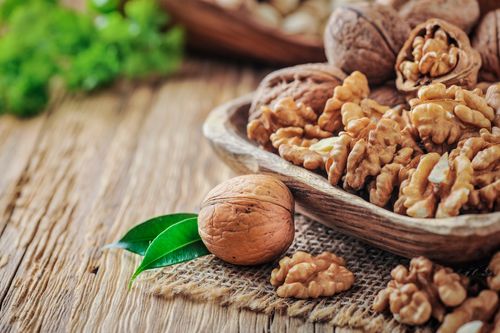
Les noix sont la dernière noix qui peut faciliter la perte de poids. Une étude menée sur la consommation de noix a révélé que des progrès significatifs en matière de perte de poids peuvent être réalisés, à condition qu’ils soient consommés alors qu’un déficit calorique était maintenu. Les auteurs de l’étude ont également conclu que les graisses saines contenues dans les noix servaient à réduire considérablement la pression artérielle et à améliorer les niveaux de cholestérol et de triglycérides.
Remarque: bien que le corps puisse ne pas absorber le nombre total de calories, les noix contiennent quand même un nombre relativement élevé de calories. Par conséquent, si vous consommez une grande quantité de noix chaque jour, vous consommerez probablement beaucoup de calories, ce qui peut vous sortir d’un déficit calorique. Par conséquent, même s’il est recommandé d’ajouter des noix à votre alimentation, assurez-vous que la quantité n’est pas extrêmement élevée. Une recommandation utile à suivre est de ne pas consommer plus d’une portion de noix par jour (28 grammes). Cela équivaut à environ vingt amandes, soixante pistaches ou dix noix.
Résumé
Les noix ne servent pas seulement de collation nutritive, mais la recherche suggère que les noix peuvent améliorer la santé cardiaque, augmenter le taux de perte de poids et se révéler généralement bénéfiques pour la santé et la fonction. Par conséquent, il est absolument recommandé d’ajouter des noix à votre alimentation, cependant, soyez conscient de la taille des portions et assurez-vous qu’un nombre approprié de noix est consommé.

